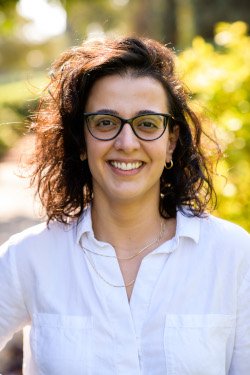Elena Meirzadeh
2023 Regional Award Finalist — Post-Doc

Current Position:
Senior Scientist
Institution:
Weizmann Institute of Science (previously, Columbia University)
Discipline:
Inorganic & Solid-State Chemistry

Current Position:
Senior Scientist
Institution:
Weizmann Institute of Science (previously, Columbia University)
Discipline:
Inorganic & Solid-State Chemistry
Recognized for: Synthesizing a molecular two-dimensional form of carbon that has opened up a new class of materials with enormous potential applications in energy storage and tunable optoelectronics. Her new carbon crystals are formed from superatoms—large molecules made from many atoms—and they have a higher thermal conductivity than other forms of molecular carbon, making them uniquely able to dissipate heat.
Areas of Research Interest and Expertise: Two-dimensional materials, Carbon allotropes, Functional materials
Previous Positions:
Research Summary:
As technology advances, nanomaterials are playing an increasing role in shaping the future of fields as diverse as engineering, electronics, and medicine. Nanomaterials research aims to improve our understanding of materials at the molecular level in order to engineer substances with specific characteristics that can be used to solve some of society’s most pressing problems. Elena Meirzadeh, PhD, is synthesizing novel two-dimensional (2D) nanomaterials with unique electronic, optical, and thermal properties.
Meirzadeh creates functional materials assembled from superatoms—nanoscale building blocks. She has designed a method to grow high-quality single crystals that can be chemically purified and mechanically exfoliated, resulting in ultra-clean single-element flakes. One of these materials is graphullerene, which consists of layers of fullerene molecules peeled into 2D sheets as thin as a single molecular carbon. This unprecedented form of carbon has a higher thermal conductivity than other forms of molecular carbon, making it uniquely able to dissipate heat—an important quality in electronics. Importantly, Meirzadeh’s findings have the potential to produce further new forms of carbon with virtually unlimited complexity that are chemically prepared through the use of molecular precursors.
Meirzadeh’s breakthrough research is not only making fundamental contributions to the field of material science but is also leading to next-generation functional materials, like tunable optoelectronics—including photodetectors and LEDs. The incredible materials created by Meirzadeh have applications in cutting-edge technologies like clean energy and new optical and electronic devices. Through her unique insight and creative solutions, Meirzadeh is forging a new path in materials research and synthesis.
“In my wildest dreams, I did not think that one day I will synthesize a new form of carbon, the most fundamental element in the periodic table. I am looking forward to more exciting results, being discovered together with the students in my research group.”
Key Publications:
Other Honors:
| 2022 | Foresight Fellowship, Foresight Institute |
| 2022 | Women’s Postdoctoral Career Development Award in Science, Weizmann Institute of Science |
| 2020 | Forbes Israel’s 30 Under 30 List |
| 2018 | Israel National Postdoctoral Award for Advancing Women in Science |
| 2018 | Rothschild Postdoctoral Fellowship, Yad Hanadiv |
| 2018 | The Dimitris N. Chorafas Prize for outstanding graduate students |
| 2018 | The ICS (Israel Chemical Society)-Uri Golik Prize for an Excellent Graduate Student |
| 2017 | Invited speaker, Gordon Conference on Crystal Growth and Assembly, Maine |
| 2016 | The Intel-IVS (Israel Vacuum Society) Best Female Scientist Award |
| 2015 | Lodovico prize for the most dynamic student, Italy |
In the Media:
In the Pipeline by Derek Lowe – Graphullerene Exists
The Register – Move over, graphene. There's a new super-material in town: Graphullerene
Women in Science – Meet Dr. Elena Meirzadeh
Columbia News – Synthesizing Superatoms and Finding Success in Science
Weizmann Compass – Scientists of Tomorrow